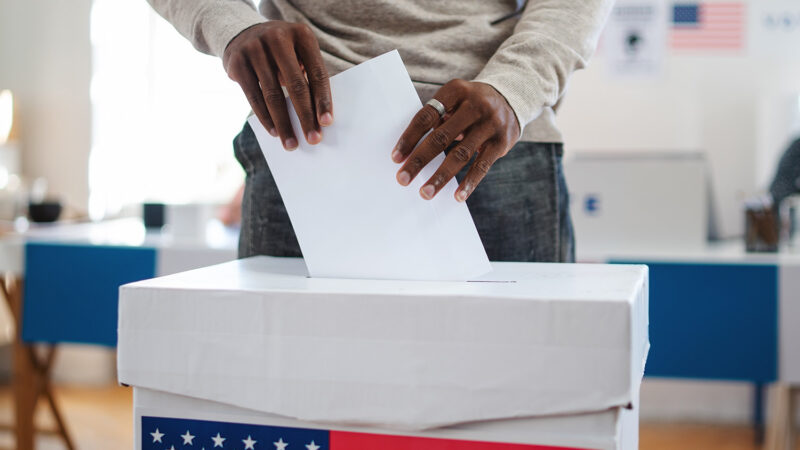A Time for Choosing Democracy
- December 13, 2017
Recently, Ben Wittes triggered a Twitter thought boomlet by proposing a Statement of Principles of the #
Many, from The Daily Beast’s Michael Tomasky on the left to The Washington Post’s Jen Rubin and The Weekly Standard’s Bill Kristol on the right quickly asked where to sign up. Not everyone on the left agrees. Jeet Heer at The New Republic expressed concern that such a centrist — we would say patriotic — project might demoralize Democrat base voters, even calling it “a lethal move for the left.”
Count us on Wittes’s side. More than just agreeing in principle, we’re doing something about it. We are two people who have spent much of our careers in conservative circles. Soren worked for Senator John McCain’s campaign for President, a Republican Member of Congress, and conservative and libertarian causes. Cameron clerked for conservative federal judges such as the Hon. Edith Brown Clement and worked at Gibson, Dunn & Crutcher. Recently, we joined Protect Democracy as Director of Communications and Policy, and Counsel, respectively.
All Americans should be concerned about the state of our democracy, and that includes conservatives. The United States is in the midst of a long-term democratic decline that must be stopped.
The framers of the Constitution recognized that both factionalism and illiberal tyrants pose an existential threat to individual liberties and democratic governance. The genius of the Constitution lay in its creation of a set of checks and balances designed to prevent any one person or branch of government from accumulating too much power. But the institutions we depend on to safeguard our most fundamental liberties are sick.
Under the framers’ scheme, Congress served as a vital check on presidential power. But throughout the twentieth and the twenty-first centuries, Congress has become increasingly overtaken by hyper partisanship and avoiding accountability for the hard problems we face. The inevitable result: we stumble from crisis to crisis as Congress is barely able to perform even the most basic legislative functions. Instead, we depend on the president for basic governance, which is alarming because the president can only be checked by the courts in specific circumstances.
So we’ve ended up in precisely the situation that the framers strove to avoid. The ongoing functioning of democratic governance in the United States depends on the president’s willingness to adhere to democratic norms and follow court orders. And the recent election of a president with alarming tendencies—from attacking federal judges to bemoaning the safeguards that keep him from ordering politically-motivated prosecutions—showcases just how vulnerable we are.
We did not end up here through the actions of one party alone. But the time for assigning blame has ended.
Our neglect of our institutions has created a crisis, and we are quickly entering what Churchill would term “a period of consequences”—a period in which, if we don’t quickly take steps to halt our ongoing democratic decline, it may soon be too late. Yet, despite the ever-rising threats to our democracy, too many remain focused on obtaining the next short-term policy win—whether it be appointing a new federal judge or passing some favored piece of legislation—regardless of the consequences that it might have for our democratic institutions.
The United States is not alone in facing these challenges. Democratic governance is under siege around the world. There have been political earthquakes throughout Europe with the rise of far-left and far-right parties. And even worse, countries such as Hungary, Poland, and Turkey have increasingly backslid from ascendant democracies to illiberal, authoritarian states. Such events should be alarming to supporters of democracy in the United States, because it could happen here as well.
That’s why we joined Protect Democracy, which is an organization founded to confront these very challenges to ensure that what has happened in these other countries does not become our story. That is a mission that is entirely nonpartisan, and indeed Protect Democracy does not work on policy issues (e.g., health care policy, tax policy, energy policy) on which left and right in a healthy democracy may disagree. Rather, we work to strengthen the norms and institutions of our democracy that allow for those democratic deliberations to take place. We aim to buttress independent institutions, ensure shared facts, stop executive power grabs, protect dissent, and safeguard the integrity of elections. We hope that in joining we not only advance Protect Democracy’s critical mission, but also signal to others that there are certain fundamental issues that must transcend partisan politics if our republic is to survive.
As a young Abraham Lincoln explained in 1838, a potential American demagogue can only be stopped when the people of the United States remain “united with each other, attached to the government and laws, and generally intelligent.”
So join us in building guard rails around our democratic institutions. Together, we can ensure that our democracy will remain strong and our liberties will remain secure.
Related Content
It can happen here.
We can stop it.
Defeating authoritarianism is going to take all of us. Everyone and every institution has a role to play. Together, we can protect democracy.
Donate
Sign Up for Updates Sign Up for Updates
Explore Careers Explore Careers
How to Protect Democracy How to Protect Democracy

